




The Salvation Army is a Christian church and registered charity seeking to share the good news of Jesus and nurture committed followers of him. We also serve people without discrimination, care for creation and seek justice and reconciliation. We offer practical support and services in more than 700 centres throughout the UK. Go to salvationarmy.org.uk/find-a-church to find your nearest centre.
The Salvation Army first published a newspaper called the War Cry in London in December 1879, and we have continued to appear every week since then. Our name refers to our battle for people’s hearts and souls as we promote the positive impact of the Christian faith and The Salvation Army’s fight for greater social justice.
Editor: Andrew Stone, Major
Deputy Editor: Philip Halcrow
Staff Writer: Emily Bright
Staff Writer: Claire Brine
Staff Writer: Ewan Hall
Editorial Assistant: Linda McTurk
Graphic Designer: Mark Knight
Graphic Designer: Natalie Adkins
Email: warcry@salvationarmy.org.uk
The Salvation Army
United Kingdom and Ireland Territory
1 Champion Park London SE5 8FJ
Tel: 0845 634 0101
Subscriptions: 01933 445445 (option 1, option 1) or email: subscriptions@satcol.org
Founders: Catherine and William Booth
International leaders: General Lyndon Buckingham and Commissioner Bronwyn Buckingham
Territorial leaders: Commissioners Jenine and Paul Main
Editor-in-Chief: Major Julian Watchorn
Published weekly by The Salvation Army
© The Salvation Army United Kingdom and Ireland Territory ISSN 0043-0226
The Salvation Army Trust is a registered charity. The charity number in England, Wales and Northern Ireland is 214779, in Scotland SC009359 and in the Republic of Ireland CHY6399.
School has been out for summer for a while now, so parents and children are adding to the other holidaymakers and day-trippers enjoying a break.
The summer is a busy time for visitor attractions, particularly outdoor ones such as The Salvation Army’s Hadleigh Farm. In this week’s War Cry staff writer Emily Bright looks back on her recent visit to the site in Essex.
She met with estate director Ciaran Egan, who showed her around the 900 acres, which are home not only to a farm but also to an Olympic mountain bike track, the remains of a former royal residence and a vocational training centre that helps people develop life skills and equips them to work in sectors such as hospitality.
Ciaran also explained how he hopes that the farm’s rare breeds centre will help to educate people about the conservation of endangered species in the UK while actively caring for creation. And he spoke about a regular ‘Muddy Church’, which uses nature and craft activities to help families explore Christianity.
‘We’re a church without walls and create space for transformation,’ Ciaran told Emily. ‘We want people to experience the light and life and love of Jesus.’
Through the years, many people have found their belief in God to be strengthened when they spend time in the natural world that he created. However, Christians also believe that God gives them – and all people –the responsibility to look after his creation.
That’s why The Salvation Army is convinced that, as a church, it has a role to play in caring for this planet – not just through its agricultural practices and rare breed conservation work at Hadleigh Farm, but also in its responsible use of energy and resources wherever it is at work around the world.
As this summer has already seen a number of heatwaves as the climate changes, we can feel for ourselves that it’s a responsibility we all share.
Printed by CKN Print, Northampton, on sustainably sourced paper
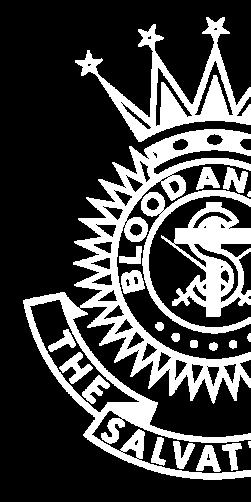

Your local Salvation Army centre

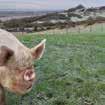




TV preview: The Fortune Hotel Wednesdays and Thursdays ITV1 and ITVX
By Claire Brine
The cases are packed. The rooms are ready. And the guests are preparing to check into a Caribbean paradise as ITV’s The Fortune Hotel returns for a second series.
Hosted by Stephen Mangan, the programme invites pairs of competitive holidaymakers to a swanky hotel in Grenada, where they will plot, plan and potentially deceive one another in their attempts to win a suitcase containing a cash prize of £250,000.
After meeting the 11 pairs of contestants at the island’s airport, Stephen drops the first bombshell. There are only 10 rooms available in the hotel, meaning that one couple will be out of the competition before it has properly begun. To secure their place on the hotel guest list, the teams must race to get their hands on one of the treasured room keys, which are bobbing about in the sea, stuck to some buoys.
Dashing to the jetty, the holidaymakers spot 11 boats and climb aboard. But first they must complete a crossword to prompt the captain to start up the engine. Motherand-son duo Sue and Jeremy complain that they’re not crossword people – but do their best to focus on the task in front of them.
Once the teams finally reach the buoys, they scrabble for the keys and head for the shore. But one pair arrives on the sand empty-handed. Is it time for them to pack their bags and head home?
Whatever the case, one pair will end the day with the prize money in their possession. The other contestants will do their best to get their hands on the treasured suitcase as the competition unfolds.
As the pairs talk tactics in their hotel rooms and consider who the fortune holders might be, game plans start to surface.
‘We’re not here to make friends,’ says Atholl, who has teamed up with his dad, John. ‘You don’t win money by being nice.’ Perhaps such an approach will serve Atholl well. And perhaps, broadly speaking, he’s right. When it comes to how we behave in life, being ‘nice’ doesn’t guarantee that we will get everything our heart desires –whether that’s fame, fortune or some other happy ever after.
But living a life with love at the centre is what the Bible encourages humankind to do. Jesus promised his followers that when a person’s motivation is to love God and to love others, they will experience the richness of ‘life in all its fullness’ (John 10:10 Good News Bible).
The life that Jesus offers – one driven by love, bursting with joy, filled with peace and strong in hope – is open to everyone. It’s a life that money can’t buy.
Girls’ organisation provides a guide for us all
Sarah Olowofoyeku gives her take on a story that has caught the attention of War Cry reporters
Girlguiding has undergone one of the biggest changes in its 116-year history, with the introduction of 72 new badges.
The 300,000 girls who meet regularly as Rainbows, Brownies, Guides and Rangers can now earn badges for a broader range of activities and skills, including codebreaking, engineering, friendship, helping the environment, using your voice to make an impact, finding inner peace and developing daily healthy habits.
The new badges were designed and tested out by thousands of girls and volunteers, including TV presenter Angellica Bell, a Girlguiding ambassador. She said that the organisation ‘offers a safe and welcoming space for all girls’, and that she is ‘so impressed by the work they do to build girls’ confidence and wellbeing’.
Eighteen-year-old Fatima, who belongs to Girlguiding’s youth steering group, said that the new badges showed how the organisation’s programme was ‘always evolving with us’.
The Girlguiding movement was initially developed in 1909 to recognise women’s abilities in activities they were not traditionally allowed to participate in, such as hiking, camping, aviation mechanics and axe-wielding.
It’s great to see that the movement is continuing to recognise how girls’ needs and roles in society are changing, but also that it places value on the simple things in life. One of the new badges that the youngest girls –Rainbows (aged four to seven) – can earn is for laughter. The celebration of ordinary joy, wellbeing and interests is refreshing.
For those of us who aren’t in Girlguiding programmes and can’t actually earn any of these new badges, we can still take something from this latest development – that is, achievements don’t have to look one certain way.
In a day and age when women and men can be judged on so many external factors, the encouragement to express ourselves and pursue adventure in our own way is freeing.
God made us all to be unique, with our own skills, talents and interests. And the best way to honour him – and to be our best selves for the benefit of people around us – is to embrace and celebrate all the abilities we have.
A Salvation Army centre for people experiencing homelessness in Swindon has opened a sensory room to support the mental wellbeing of its residents.
Staff at Booth House Lifehouse turned an unused office into a relaxation room after assistant support worker Jay Wiles (pictured) noticed how residents and staff were struggling with anxiety, stress and sensory overload.
The calming space contains massage chairs, adjustable LED lighting, fidget toys, adult colouring books and aromatherapy diffusers. Users are also able to listen to relaxing playlists and can write messages of encouragement for one another on a ‘tree of hope’.
Booth House Lifehouse supports adults who face homelessness –often because of addiction, mental health challenges or financial hardship – by offering structured pathways to long-term housing.
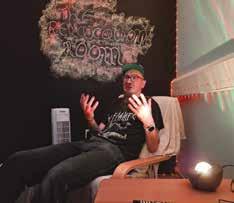

Alice Cooper spoke to The Times about the importance of his Christian faith in his life.
In the interview, the rock star revealed that he had read the entire Bible ‘14 or 15 times’ and teaches a weekly Bible class close to his home in Phoenix, Arizona.
‘That’s the secret,’ he said. ‘Being a rock star is about the fifth most important thing I do. In the UK they wanted to ban me, but if Mary Whitehouse could see me now she’d smile: I never blaspheme; I never use upside-down crosses – that offends me. I run three youth centres in Arizona for vulnerable children. And I do it because Heaven and Hell are real and one day I will have to answer to Jesus.’
The article reported that the singer attended rehab in the late 1970s after struggling with drug and alcohol addictions, but ‘stopped indulging one day 42 years ago and found God’. Today he prepares for gigs by having an afternoon nap, watching a kung-fu film, then it’s time for ‘make-up and 10 minutes of prayer’.

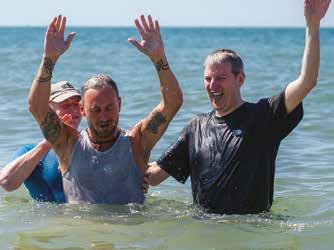
Hundreds of people gathered on Boscombe beach in Bournemouth during a recent heatwave for a joint baptism service by five churches.
Premier Christian News reported that 92 people publicly confirmed their faith in Jesus by being baptised in the sea, including some who made the decision spontaneously during the service.
‘We’re delighted to share the gospel with people where they are,’ said Mark Smailes, associate pastor of Lansdowne Church. ‘God is still good, and the grace of salvation is held out to all.’
Hildegard von Bingen, a 12th-century German abbess, has become ‘the hottest name’ in contemporary experimental music, reported The Guardian. The paper described how the nun’s music had transcended its medieval origins, inspiring a wide variety of music genres.
Hildegard’s influence began to grow after the 1980s release of an album of her music, A Feather on the Breath of God, and brought her work to a wider audience. Today her work is continuing to inspire artists and composers.
The article said that her life story of transformation – in which she emerged from illness and experienced visions of God – resonated with modern themes of neurodiversity and resilience.
The Salvation Army’s Hadleigh Farm has proved to be an ideal destination for a day out while also offering a space for transformation
Feature by Emily Bright
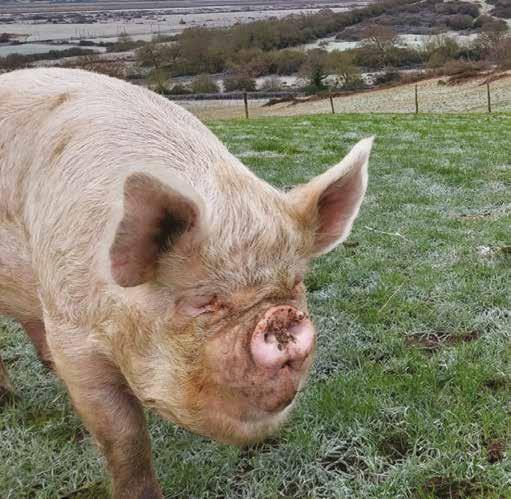

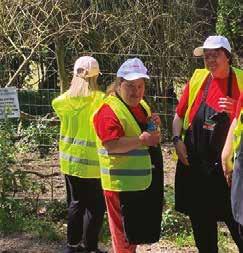
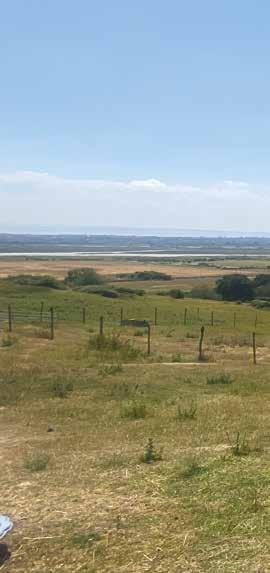
Arriving at Hadleigh Farm in Essex, I’m struck by the hive of activity. A group of green-shirted toddlers are out on a guided walk, customers are enjoying bacon butties in the Hub Café and the cycling rental shop is gearing up for another sunny day.
I’m here to meet the estate director Ciaran Egan to find out more about the activities taking place at the Salvation Army site this summer. The first thing he mentions is a family-friendly summer music festival – something that people wouldn’t perhaps associate with a church and charity. Running from 2pm to 6pm, each fortnightly event in the festival has been featuring a different type of music –still to come in the series are a DJ set of 1990s club classics and a covers band playing 1960s beat music.
‘We’re trying to cover a lot of broad bases music-wise – almost as a hook to get different people to connect with us,’ he explains. ‘After experiencing that, they’re comfortable enough to explore the other activities that we’ve got.’
Those other attractions include a rare

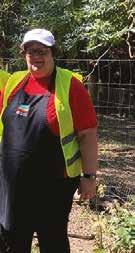
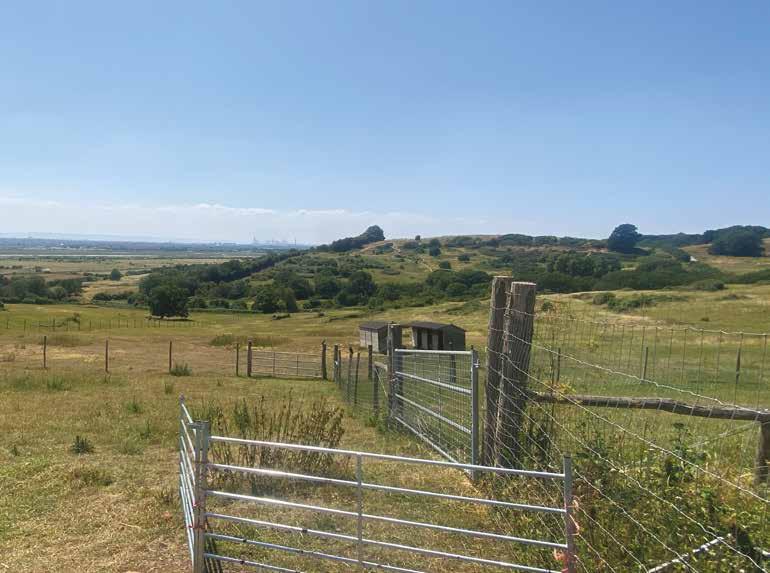
breeds centre, home to animals such as sheep, goats and pigs. It attracts more than 24,000 visitors a year. And when it has taken part in Open Farm Sunday – an annual event in which people across the country are invited to learn more about agriculture and the environment – it has laid on on special activities such as tractor displays and demonstrations of sheep shearing.
For Ciaran, the rare breeds centre is all about engaging members of the public in what The Salvation Army does.
‘We’ve got a window from toddler age to seven years old to connect with people,’ he says. ‘And we’re able to educate people about the conservation of rare breed species in the UK while actively caring for creation.’
The Salvation Army is also caring for creation in the way it manages its lands.
‘We’ve gone through arable reversion on the marshlands, so we no longer farm that for crops,’ explains Ciaran. ‘We have cattle that are grazing the marsh, which will create a habitat for wading birds. Then, as we progress through the years,
we’re going to see nesting birds and hatchlings.’
Hadleigh Farm appeals to many types of visitors beyond animal lovers. The 900-acre site offers plenty of space for physical activity too.
Atrackwas built at the site to host the Olympic mountain biking events at London 2012, which many mountain bikers have benefited from since. As part of Hadleigh’s country park, which is managed by Essex county council, there are also trails and bridleways used by walking groups and horse riders respectively. Hadleigh hosts a weekly 5k Parkrun too.
For the history buffs, the site is also home to Hadleigh Castle, the royal residence of Edward III during the 14th century, which is now operated by English Heritage.
‘The castle attracts another tranche of
people,’ says Ciaran, ‘who come along to see the views around the castle and the estate and out to the Thames estuary and up to London, then looking the other way to Southend and the pier.’
The beauty of the site resonates with Ciaran’s Christian faith.
‘For me, it’s a spiritual place to go – you can see the breadth of humanity while looking into the city, and you’re surrounded by creation in the foreground.
‘There’s something striking about being in a developed, built-up area, then coming down a country lane and being out in an abundance of nature. People experience something here. I envisage it as bathing in God’s creation.’
And, walking around the site, I’m inclined to agree that it’s a special place.
At the heart of The Salvation Army’s ethos is the principle of sharing the Christian faith through practical action. This is partly facilitated through Hadleigh
Training Centre, which provides people with vocational training and helps them to develop life skills such as socialising in new environments.
One of the results of the centre is the Hadleigh Tearoom, which trains people in hospitality and front-of-house service, building their sense of confidence and self-worth.
‘In conversation with trainees, we worked towards a social enterprise approach,’ Ciaran tells me. ‘The trainees would own, operate and decide just about everything that comes with running a café. It allows them to develop a customer service-type skill set.
‘It’s a table waiting operation – so they are meeting, greeting, seating, taking orders. They provide a typical baristatype service as well. It encompasses a lot of practical customer service and hospitality skills. Then they also are gaining experience back of house, with the food prep, general cleanliness, dishwasher use, that type of thing.’
Ciaran has been encouraged by the personal growth in the Hadleigh Tearoom trainees. When I ask him for an example of people changing as a result of working there, he enthuses about one particular person.
‘One of our trainees had all the skills but didn’t have the confidence or selfesteem to deliver that ability,’ he says. ‘And the team were trying to build them
up. That started small, with the trainee still articulating: “If we open to the public, I won’t be able to do this.”
‘The trainee then participated in additional days within the tearoom setting, so they could do everything within that operation and become completely independent. Now they’re able to confidently meet new people who come through the door, sit them down, engage with them and talk to them about the tearoom and what it has meant to them.
We’re a church without walls
‘Lifeexudes from them. Eighteen months ago, they were physically trembling about the idea of being left independently to make a cappuccino, because they believed that they wouldn’t be able to do it. But now they make customers feel at ease, as the best kind of front-of-house person in the industry would be able to. Seeing them overcome loads of barriers – which they now realise they were putting in place themselves –is quite special.’
For Ciaran, connecting with people is at the heart of what Hadleigh Farm does. As well as interacting with trainees and visitors, the staff team also work tirelessly to engage with the community.
‘The Salvation Army at Hadleigh is operating a very active summer programme,’ he says ‘We’re trying to meet community-based needs around mental health or general wellbeing issues, which we can explore with people through relationship.
‘A number of families who come to our events, such as the music festival, might come to a more specific weekly offer, like our outdoor toddler group Tree Tots, summer days out, our self-led walks or family craft activities. Then they may progress on to a more spiritual, faith and fellowship focus.’
Ciaran becomes particularly animated when talking about Hadleigh Farm making faith more accessible to people through events such as “Muddy Church”, which uses nature and craft activities to help families explore Christianity.
‘Some people are expressing that this is the first time that they’ve connected with the idea of church, with each other and with something greater than themselves. They are able to be vulnerable, sharing things that they wouldn’t have felt comfortable sharing in a traditional church setting.
‘We’re a church without walls and create space for transformation. I have absolute faith that Jesus is going to provide that transformation. We want people to experience the light and life and love of Jesus.’
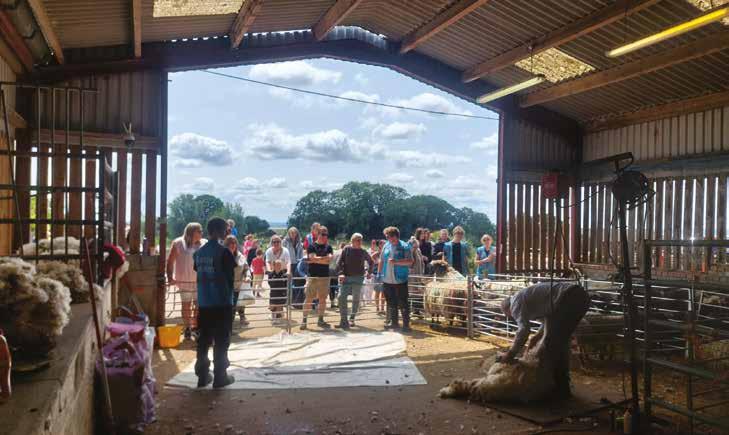
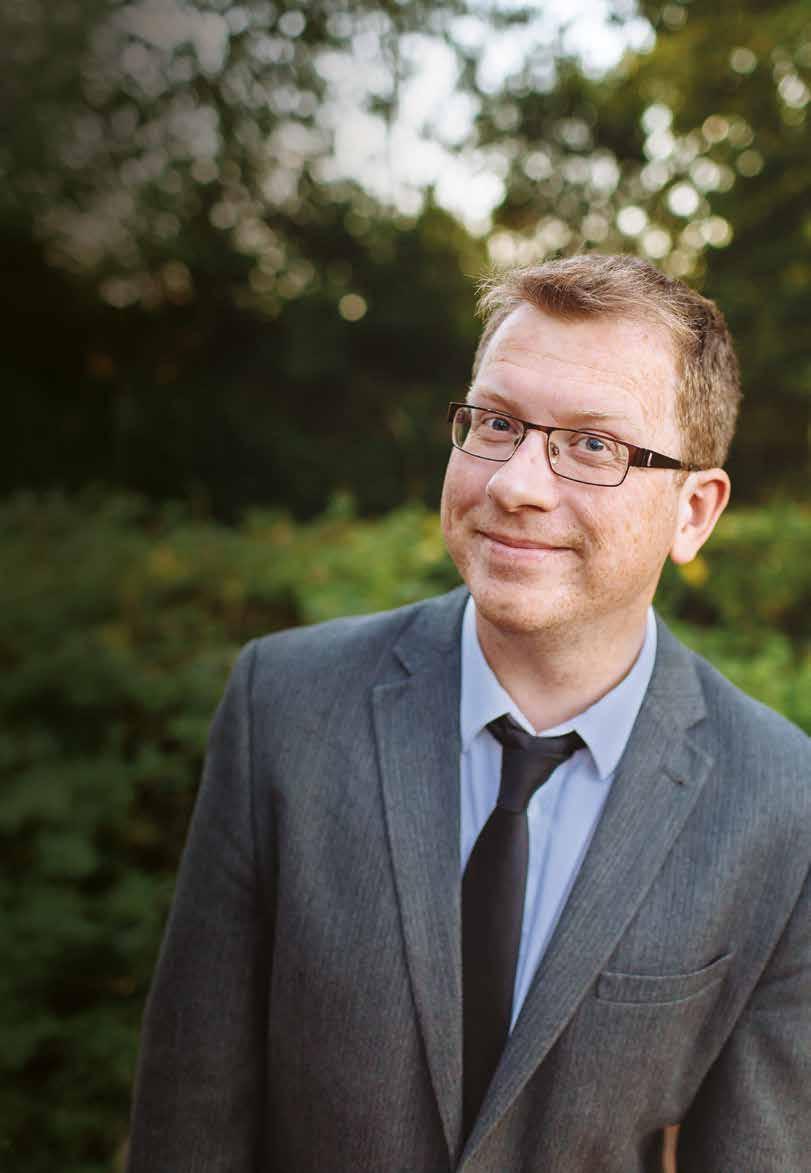
TV comedy writer PAUL KERENSA tells how he has written children’s books about historical role models to help tackle toxic masculinity
Interview by Emily Bright
Scientist Edward Jenner, nurse Edith Cavell, hymn-writer John Newton, abolitionist Harriet Tubman and Dutch watchmaker Corrie ten Boom –who hid Jews in her home during the Second World War – shared two things in common. They were all Christians, and their stories are told by TV comedy writer Paul Kerensa in his children’s book series. Fantastically Faithful World Changers Who Gave Their All for God and Fantastically Faithful Heroes Who Gave Their All for God were published earlier this year, and there are two more books in the pipeline.
‘They’re all exciting stories,’ says Paul, whose TV writing credits include sitcom the Miranda and CBBC series The Revolting World of Stanley Brown. ‘But they can also feel quite extraordinary and intimidating. For example, Edward Jenner is creating the vaccine and giving
it away for free, saving millions of lives. It can feel like: “How does that impact my life as a reader? I’m just a person.” Yet I think all these people also were ordinary – even though they ended up doing extraordinary things.
‘They didn’t set out to change the world. They just looked out for their neighbour.
‘For instance, Thomas Barnardo was training to be a doctor and walking through central London when he found all these children sleeping on street roofs and thought: “Well, that’s wrong.” He saw a need and helped to fix it.
‘And John Harper was a chaplain on board the Titanic, helping people and preaching the gospel to them as the ship
Turn to page 10 f
was sinking, making sure that they knew Jesus.’
As Fantastically Faithful Heroes details, John also gave up his life jacket so that someone else could live.
Paul believes that highlighting positive role models from history and telling their stories is more important than ever, given the growing discourse around ‘toxic masculinity’ – described by the UK government as ‘a term which is commonly used … in relation to social problems potentially arising from traditional, restrictive and harmful gender norms and expectations for men and boys: for example, that they should be tough, active and dominant’. As a parent to teenagers, Paul is conscious of the dangers that online influencers can pose.
‘There are pretty toxic spaces online,’ he says. ‘The internet is a Wild West. We have to keep trying to regulate it, but
also we have to do our best to be aware of what our children are looking at, and what access they have to the internet.’
While he admits that his children’s books aren’t necessarily the ‘magic bullet’, Paul believes that ‘we have to keep on giving opportunities for young people to hear these stories and be inspired and influenced in a better way’.
You’ve got to cast your net broadly
He also felt that it was crucial to highlight positive female role models in his book, avoiding ‘just a Boy’s Own adventure’.
‘I think it’s helpful – just talking about young boys for a minute – to show there are heroic women doing these great

things as well,’ he says.
‘For instance, there’s Harriet Tubman, who escaped slavery and helped others escape it via the Underground Railroad. She’s this heroic and inspirational woman – especially in an age of patriarchy.’
The heroes featured in Paul’s books are deliberately diverse. The line-up includes African-American George Washington Carver, a farmer, inventor and educator; Pandita Ramabai, a female Indian scholar and activist who supported thousands of widows and orphans; and Professor Dr Wangari Maathai, a Kenyan environmentalist, activist and feminist.
‘You’ve got to cast your net broadly,’ says Paul. ‘There’s no point in going: “Let’s have eight white men from Surrey because that’s who I am.” If you write what you don’t know, you can actually meet readers where they are.
‘I did my first school visit to promote Fantastically Faithful World Changers and picked what I thought was the least famous name – Wangari Maathai, the first African woman to win a Nobel peace prize. And there was this six-year-old kid who put his hand up and corrected my pronunciation, saying he was related to her. He was telling me things about her I didn’t know. He saw himself and his family reflected back.’
While writing the Fantastically Faithful series, Paul has been most struck by the fact that, despite the figures all having different experiences of faith, they were all united by their belief in God and Jesus.
‘There were lots of different approaches that these heroes and worldchangers took,’ he explains. ‘You see people who have grown up in the Church of England or Catholicism, we’ve got Quakers, Methodists and many others as well.
‘Some were born into the faith, like where their dad was a priest. Others found faith later on in life. If this is like a microcosm of life, you can see that different faith journeys can lead you still to worshipping or following God.’
And, as a Christian himself, Paul decided to end each chapter with references to faith and discussion questions.
‘I wanted the discussion questions to prompt the young reader to go: “OK, what have we learnt here, how does that make me feel, how does that impact on my life?”
‘Having those grounding elements, then ending with a little Bible verse and
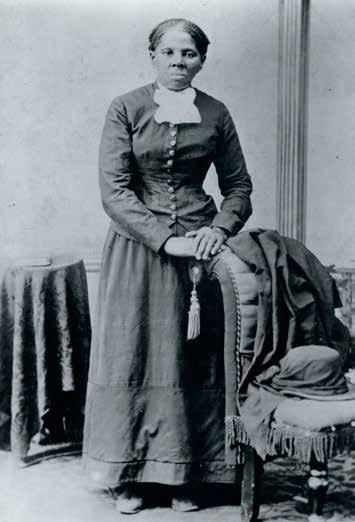
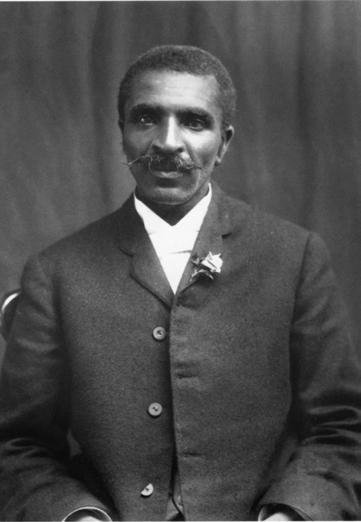
prayer, anchors it in our faith today.
‘I hope that these true-life stories will show people that you can stand up for what’s right, that you do not need to be afraid to go against others, and that there is a better faith-filled life of action. Doing heroic and good things is also what it can mean to be a man and to be a woman today.’
For Paul, examining the faith that defined these true lives was essential.
‘Working out how we make this world better by looking at what Jesus asked us to do,’ he says, ‘and trying to live by that self-sacrificial model is crucial. Each of these stories embodies that element of self-sacrifice.’
Following Jesus has anchored Paul in all that he does, and he is always drawn back to his faith.
‘It’s important to keep on returning to Christ,’ he remarks. ‘Otherwise, like a
ship at sea, you’re going to find yourself just going one or two degrees out, which – before you know it – sends you in the wrong direction. Faith is something that I am tuning into more than ever. We need to keep on making sure that we are right with God. It’s down to us. We’ve got all these other influences coming in and it’s up to us to filter them out.’
He believes that Jesus is the most powerful influencer in history.
Whatever your background or upbringing, it’s never too late
‘Instagram,
TikTok, they will come and go. They may be replaced by something the same or worse. But Jesus, for 2,000 years, has been the most
influential person, and will continue to be.’
Paul adds that – with the help of faith –the extraordinary isn’t the preserve of the people featured in his books.
‘Whatever your background or upbringing, it’s never too late,’ he asserts. ‘God’s got a plan for you and you can do great things. Just keep your eyes on God and do those things.’
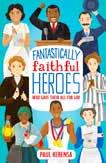
Your prayers are requested for Laura, that the Lord will give her the willpower she needs; and for Doreen, who has had back pain.
The War Cry invites readers to send in requests for prayer, including the first names of individuals and details of their circumstances, for publication. Send your Prayerlink requests to warcry@salvationarmy.org.uk or to War Cry, 1 Champion Park, London SE5 8FJ. Mark your correspondence ‘Confidential’.
jThere is no set formula to becoming a Christian, but many people have found saying this prayer to be a helpful first step to a relationship with God Becoming a Christian
Lord Jesus Christ,
I know that I have done things in my life that are wrong and I’m sorry.
Thank you that I can ask you for forgiveness because of the sacrifice you made when you died on the cross.
Please forgive me and help me to live a better life in the future as I learn how to love you and follow your way of living.
Thank you, Lord Jesus.


Prophesying to the northern kingdom of Israel before it was wiped out by the Assyrians in 722BC, Hosea warned that, by worshipping other gods, Israel had been unfaithful to God. It had broken the covenant outlined in the Ten Commandments of having no other gods but him.
The book starts with God telling Hosea to marry a woman variously described in translations as ‘a prostitute’ and ‘a promiscuous woman’. The woman, Gomer, already has children by other men when Hosea marries her, and they have three children together.
Whether literal or figurative, the marriage is an object lesson in Israel’s fallen relationship with God, showing that the land is ‘guilty of unfaithfulness to the Lord’ (1:2 New International Version).
Unless ‘adulterous’ Israel leaves her other loves – the gods of the surrounding civilisations – God will punish her. Rains will cease (2:3). Harvests will fail (2:9). Fruit will wither (2:12).
The charge against Israel is that ‘there is no faithfulness, no love, no acknowledgement of God in the land’ (4:1). This is evidenced through ‘lying and murder, stealing and adultery’ (4:2), consorting with prostitutes (4:14), deceit (10:2), alliances with heathen nations (12:1), dishonesty in commerce (12:7) and idolatry (13:2).
Like a cuckolded husband, God is angry and heartbroken, yet still loves: ‘How can I give you up… How can I hand you over, Israel?’ (11:8).
Despite the enormity of her sin, Hosea urges Israel to repent: ‘Come, let us return to the Lord’ (6:1); ‘Let us acknowledge the Lord’ (6:3); ‘Say to him: “Forgive all our sins and receive us graciously”’ (14:2).
Such repentance will lead to restoration. God promises: ‘I will heal their waywardness and love them freely, for my anger has turned away from them’ (14:4).
Through Hosea, Israel is confronted with the reality of her sinfulness, the consequences of continuance in it and the possibility of gracious restoration.

If you’ve prayed this prayer, scan the QR code or contact us using the coupon on this page

































































War Cry 1 Champion Park London


















Which band had a No 1 hit in 1996 with their song ‘Don’t Look Back in Anger’?
Who plays
Who are the hosts of the ITV series Long Lost Family? 5 In which Scottish city is the hill Arthur’s Seat?
Which term used in tennis indicates a score of zero?

A Fringe performer entertains a crowd on the street
Feature by Ewan Hall
Edinburgh is about to be an epicentre for the arts. Over the next few weeks, The Festival Fringe will be offering more than 3,352 shows across 265 venues.
As well as fresh-faced performers who are aiming to make their mark, seasoned pros are returning, including actress Miriam Margolyes, who is following up last year’s hit show in which she recreated characters from Dickens novels, and Alan Davies, who was nominated for the best comedy award at the festival back in 1994.
The Fringe originated in 1947 when the Edinburgh International Festival was launched. That year, eight uninvited theatre groups performed on the fringes of the official event, sparking a tradition that was formalised in 1958 when the Festival Fringe Society was created.
The society continues to play a vital role. It shares information about artists, runs the box office and sets policy – with one rule: it doesn’t curate the programme, but rather allows performers of all kinds to take to the stage or streets.
This year, the Fringe is encouraging audiences to ‘dare to discover’ – that is, not just to see their favourites, but to look for something new and embrace the unexpected.
Some festivalgoers may feel uneasy at the thought of looking beyond what they’re familiar with. And that is only natural. But sometimes when we leave our comfort zone, we discover something that will have a lasting impact on us – and it could be more than just a new piece of theatre or comedy to enjoy.
Some people have dared to step out from what they knew and find out more about Jesus. And when they have, they have discovered the new kind of life that he brings us from God – a life that will never come to an end.
Jesus promised: ‘Whoever hears my word and believes him who sent me … has crossed over from death to life’ (John 5:24 New International Version).
Those who have taken up his invitation have not been disappointed.
Jesus offers a life of purpose and an eternity with God. It’s there for us all – if we dare to discover it.

ACROSS
1. Restrain (4)
3. Joke (3)
5. Eager (4)
7. Arranged (9)
9. Security device (4)
10. Feat (4)
11. Cut (5)
14. Play (5)
15. Clumsy (5)
17. Interrogate (5)
18. Dirt (5)
19. Way in (5)
20. Unable to bend (5)
23. Blue-white metal (4)
25. Couch (4)
27. Punctuation mark (4-5)
28. Labour (4)
29. Plaything (3)
30. Depend (4)
1. Fairly cold (4)
2. Yap (4)
3. Rank (5)
4. Skim (5)
5. Elderly (4)
6. Virtuous (4)

7. Instances (9)

8. Trickery (9) 11. Wiser (5) 12. Competing (5)
Irritated (5)
Excavate (3)
Attempt (3)
21. Fool (5) 22. Satire (5)
Gusto (4)
Dungeon (4)
Bitter (4)
Askew (4)


Delicate and pretty
Non-venomous snake
up, down, forwards, backwards and diagonally on the grid to find these words associated with kindness

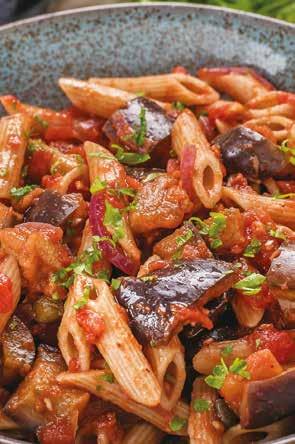
METHOD
1tsp rapeseed oil
1 large aubergine, chopped
1tsp dried oregano
½ red onion, finely sliced
1 garlic clove, finely sliced
1tbsp capers, drained
1tbsp balsamic vinegar, plus extra, to taste
400g can chopped tomatoes
150g wholemeal penne
Handful fresh parsley, roughly chopped, plus extra
Freshly ground black pepper, to taste
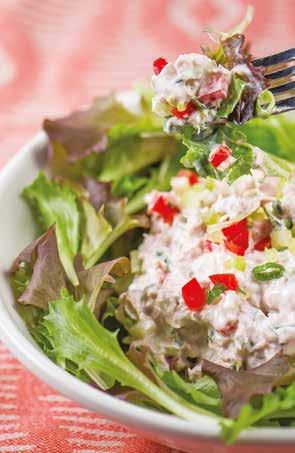
INGREDIENTS
3tbsp fat-free plain Greek yogurt
2tsp lemon juice
Small handful fresh coriander, roughly chopped (optional)
160g can tuna in spring water, drained
1 spring onion, trimmed and finely sliced
1 stick celery, trimmed and finely diced
½ red pepper, deseeded and finely diced
Heat the oil in a large, non-stick pan over a medium-high heat and cook the aubergine and oregano for 5 minutes, stirring regularly.




Reduce the heat and add the onion. Cook for 2-3 minutes, until the onion starts to soften. Add the garlic, capers and balsamic vinegar.
Once the vinegar has evaporated, add the tomatoes and mix thoroughly. Simmer for 15 minutes, then stir occasionally, until the vegetables are tender. Meanwhile, cook the pasta according to the packet instructions.

Stir the parsley into the vegetable mixture, then season with pepper and extra vinegar, to taste.
Drain the pasta and mix through the caponata sauce, to serve.

Romans 12:12
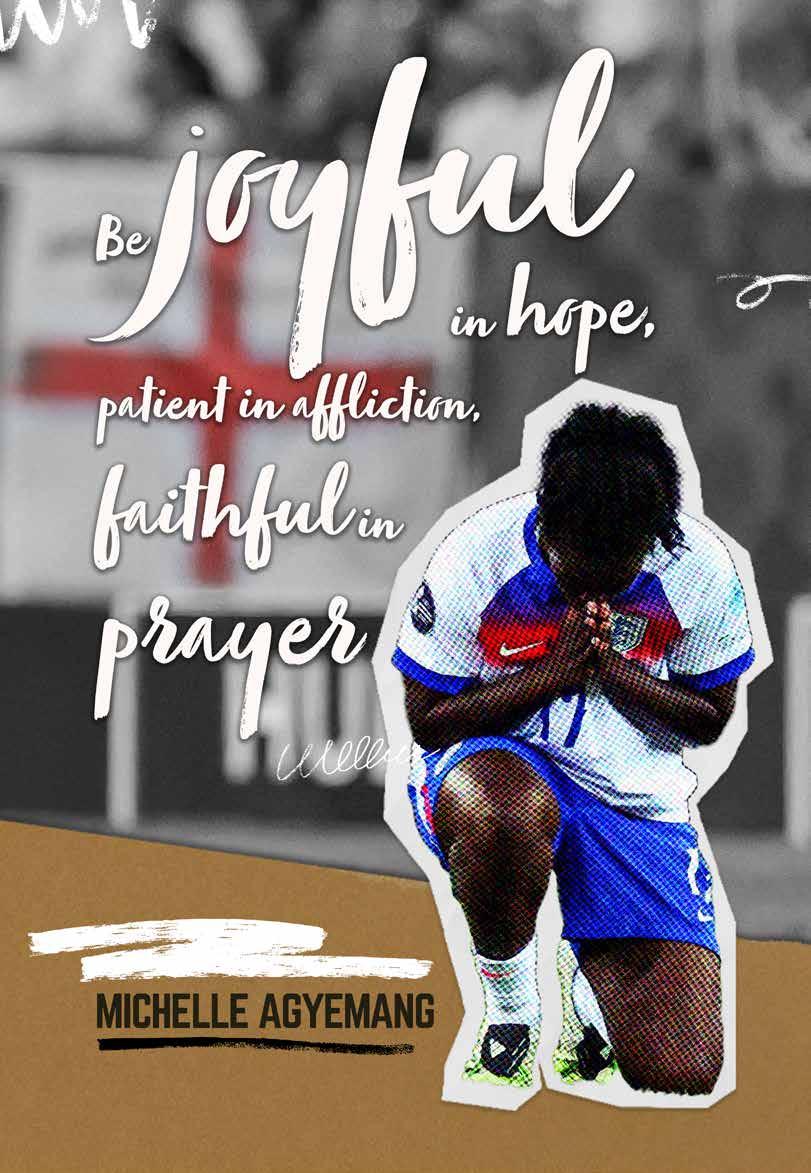
posted on Instagram by Euro 2025 winner 26 February